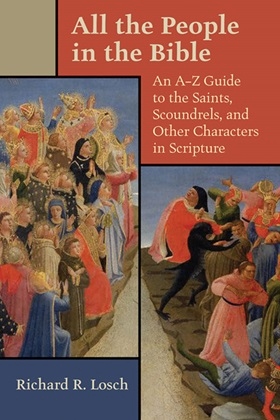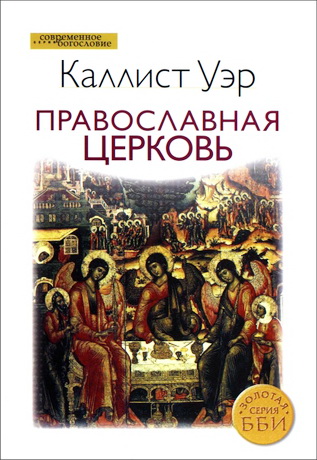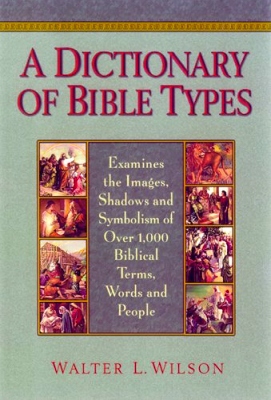
Losch - All the People in the Bible
Richard R. Losch - All the People in the Bible
An A-Z Guide to the Saints, Scoundrels, and Other Characters in Scripture. – Grand Rapids, MI: William B. Eerdmans Publishing Company, 2008. – 586 p.
ISBN 978-0-8028-2454-7 (pbk.: alk. paper)
More than any other book, the Bible offers an amazing collection of fascinating characters ranging from the holiest of the holy to some of the most depraved scoundrels imaginable. Many are mentioned only in passing, yet history and archaeology can often fill in the blanks and flesh them out as exciting human beings. For this reason we have in many cases been able to tell much more about them than the Bible alone reveals. Pontius Pilate, for example, is presented rather gently by the writers of the Gospels, yet historical records and tradition show him to have been a loathsome person.
There are many biblical names not included here except in the appendix. Many are listed in genealogies and nothing more is known of them, and others had no significant effect on history or legend. For example, there are thirty-one Azariahs in the Bible, yet in our opinion only two merit attention, and they are better known by other names: Azariah the friend of Daniel, better known as Abednego, and Azariah the king of Judah, better known as Uzziah. On the other hand, we have included several individuals who are not actually mentioned in the Bible, yet were very much involved in the events of the time. For example, the Seleucid emperors and the Hasmonean kings are ignored in the Bible, and only a few of them are mentioned in the Apocrypha. Nevertheless, they played a major role in the transition from Old to New Testament times. Alexander the Great and the Roman emperor Claudius had a profound effect on the history of biblical times, yet for a number of reasons they are either ignored or mentioned only in passing in the Bible. Likewise, it is impossible to get a full picture of any of the Herods without looking at a cross section of their whole amazingly dysfunctional family and seeing the incredible contrasts in them. Probably the best of the lot was Herod Agrippa I, who, despite his warts and his persecution of James and Peter, was a faithful Jew and basically a good man. His daughter Bernice, on the other hand, was married to two of her uncles while she carried on an incestuous affair with her brother, until she left that all behind to become the mistress of the Roman emperor’s son.
We cannot draw a neat line and put saints on one side and scoundrels on the other. In fact, most of the great leaders of Judaism and Christianity started out as the worst sort of scoundrels. Abraham lied and cheated his way through Egypt in order to save his own skin. Jacob bilked his brother out of his birthright, then deceived and lied to his father in order to cheat his brother out of his paternal blessing. David was a liar, an adulterer and murderer, a terrible husband and a worse father. Matthew was a publican, the most contemptible kind of traitor to his own people. Tradition paints Mary Magdalene as a prostitute, even though the Bible does not portray her as such and she was almost certainly innocent of that charge. Nevertheless God, working with such weak and flawed material, molded them into spiritual powerhouses and examples of moral strength and righteousness. John Claypool likens God to the medieval alchemists who tried to turn lead into gold. God takes the crudest of lead in the characters of his creatures and turns it into glorious spiritual gold. We who are equally weak and flawed should find great encouragement in this. If the likes of Jacob could become a great patriarch of the faith, then we too can become spiritually strong and righteous. As George Santayana observed, “It is easier to make a saint out of a libertine than out of a prig.”
Judaism and Christianity are the only major religions that record their history and lay out for all to see the weaknesses and flaws of their heroes. We believe this grants great credibility to the Bible as history. If it were myth, we would present our founders and heroes as paragons of perfection, or display only the flaws that demonstrate the importance of serving God or being open to his forgiveness. Instead, we show our heroes as the human beings they truly were. God has chosen to work through humans, giving them the wisdom to overcome their foolishness and the strength to overcome their weakness. “But God chose the foolish things of the world to shame the wise; God chose the weak things of the world to shame the strong” (1 Cor. 1:27). Sometimes from the most unpromising soil grows the sweetest fruit. It is not logical, but it is often true.
* * *
Josiah
Josiah was only eight years old when he ascended the throne of Judah. He was the successor of two idolatrous and despotic kings, his father Amon and his grandfather Manasseh. Fortunately for Josiah, however, he chose to eschew the evil of his two predecessors and instead walked in the footsteps of two of his more distant ancestors, the righteous kings Hezekiah and Uzziah. His faithfulness to Yahweh and to the people of Judah earned him honor and praise second only to that of Jehoshaphat and David himself.
When Josiah became king, Judah was a vassal of Assyria. That great empire was just beginning to totter under the onslaught of the rising Babylonian rebellions, and several vassal states were tempted to take advantage of that weakness. Under the counsel of his regents when he was a child, and later on of his own volition, he wisely chose not to join the rebellion, but to accept a continuation of Judah’s vassalage. While the Assyrians were dealing with their internal problems they were too busy to be hard oppressors, but an attack against them could have brought harsh reprisals. Instead, Josiah focused his attentions on the removal of idolatry from his kingdom.
As a child Josiah probably paid no more attention to his religion than do most children, simply going through the motions and doing and saying what he was told to do and say. At about the age of sixteen, however, he underwent a conversion and took an interest in the faith of Yahweh (2 Chron. 34:3). By the age of twenty he had started purging Judah of the pagan shrines and Asherah poles (phallic idols of fertility gods). By the time he was twenty-six he had begun the cleansing and rebuilding of the temple under the direction of the high priest Hilkiah.
At this point there came about an extraordinary event. In cleaning up the rubble of a damaged portion of the temple, Hilkiah found an ancient book of the Law. He had his secretary Shaphan take it to Josiah, and Josiah commanded him to read it to him. As Josiah heard the reading he tore his robes and wept, a traditional gesture denoting mourning or great calamity. The book that was read to him is believed to have been the book of Deuteronomy, and Josiah realized that the Jews had completely failed to live up to God’s commandments that were written in it. It foretold the destruction of Judah because of their sins.
Josiah sent a delegation to the prophetess Huldah, who prophesied that because of Josiah’s pious reaction to the book he would be gathered to his fathers and be buried in peace without seeing the destruction of Jerusalem (2 Chron. 34:23ff.). That was not enough for Josiah, however. He called together all the priests and leaders of Judah and read to them the entire book, demanding of them that they swear allegiance to it and follow its commandments. He cleansed the country of pagan idols and set such an example of piety that apparently he had little resistance.
Next, Josiah reinstituted the observance of the Passover, and from his own flocks and herds he supplied all the people with ritually acceptable animals for the Passover sacrifice. This great festival, which Jews since his time have taken as so basic to their faith, had been neglected for almost four centuries. Josiah reestablished the holy festival in the eighteenth year of his reign, when he was twenty-six years old.
Josiah reigned for thirty-one years, but we know almost nothing of his activities from the time of the reinstitution of the Passover until his death thirteen years later. It is universally accepted, however, that his entire reign exemplified justice, righteousness, mercy, and unswerving devotion to God.
During that period Assyria had been torn to pieces by civil wars, and Nabopolassar had built Babylonia into a mighty kingdom that had gained control of most of Mesopotamia. When Josiah was thirty-nine years old, in the thirty-first year of his reign, the Egyptian king Neco II marched on the now weak Assyrians at Carchemish in Mesopotamia (2 Chron. 35:20ff.). Josiah realized that if this were to happen Judah would be caught in the middle of a war between Egypt, Assyria, and Babylonia, and so he marched against the invading Egyptians. Neco tried to convince him that he had no quarrel with Judah and that God had commanded him to tell Josiah to keep out of the affair. Notwithstanding this warning, Josiah persisted, disguised himself, and led his troops into battle. He was cut down by an arrow and taken back to Jerusalem, where he died.
Historical records present a dilemma—it is unclear whether Josiah came to assist Neco and was treacherously murdered, or was simply trying to keep the Egyptians from passing through Judah, or was meeting his obligations to his liege lord as a vassal of Assyria. The Bible implies that he died because he failed to heed God’s command as it was given him by Neco (2 Chron. 35:21). This is actually unlikely—why would he accept a message from God from a pagan Egyptian? In fact, Huldah’s prophecy was fulfilled. Josiah died and was buried in peace without seeing the fall of Jerusalem, which would happen twenty-two years later. We must note that the prophecy was that he would be buried in peace, not that he would die in peace.
The prophet Jeremiah was Josiah’s contemporary and doubtless supported his religious reforms. He did not laud him as might be expected, however—in fact, he paid little attention to him. Perhaps Jeremiah could see beneath Josiah’s apparent piety and beheld a king whose true priority was to establish a powerful political kingdom by means of strengthening that nation’s religion. Only God (and perhaps his prophets) could see into Josiah’s heart. The Jews, however, saw Josiah as a paragon of righteousness and justice equal to David.
Jeremiah wrote a lament over Josiah’s death (2 Chron. 35:25ff.), but this writing is no longer extant and is not a part of his later book of Lamentations over the evil reigns of Josiah’s sons and the eventual fall of Jerusalem. Jeremiah condemned Josiah’s sons Jehoahaz (Shallum) and Jehoiakim. He said of Josiah, “He did what was right and just, so all went well with him. He defended the cause of the poor and needy, and so all went well” (Jer. 22:15–16). Of Jehoahaz, however, he said, “He will die in the place where they have led him captive; he will not see this land again” (Jer. 22:12) and of Jehoiakim, “They will not mourn for him.… He will have the burial of a donkey—dragged away and thrown outside the gates of Jerusalem” (22:18–19). Jeremiah said that Josiah was better off dead than to be alive to see the corruption and evil of his sons.
Josiah’s long reign was a last ray of light upon an otherwise darkening and collapsing Judah—a Judah that would soon fall into the night of destruction and captivity at the hand of God’s agents of punishment, the army of Nebuchadrezzar II of Babylon.





Комментарии
Пока нет комментариев. Будьте первым!